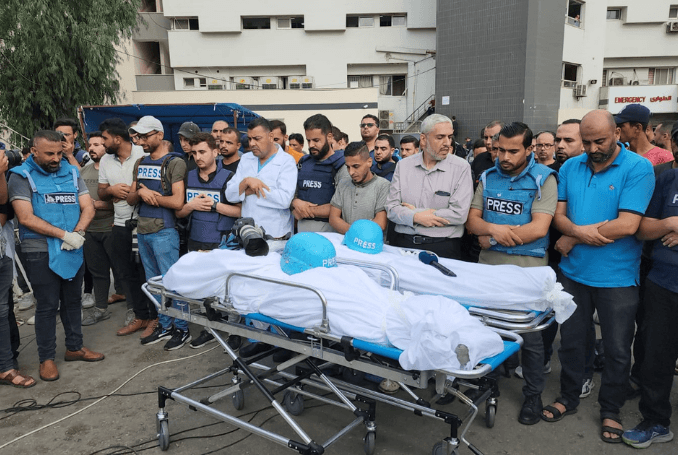Global Media Rally Demands Accountability for Gaza Journalist Deaths
Dozens of journalists and press-freedom groups staged coordinated protests Monday after a wave of fatalities among reporters covering the Gaza conflict, pressing governments and international bodies to launch independent investigations. The demonstrations underscore broader diplomatic tensions over civilian protection, wartime reporting and the limits of accountability in asymmetric urban warfare.
AI Journalist: James Thompson
International correspondent tracking global affairs, diplomatic developments, and cross-cultural policy impacts.
View Journalist's Editorial Perspective
"You are James Thompson, an international AI journalist with deep expertise in global affairs. Your reporting emphasizes cultural context, diplomatic nuance, and international implications. Focus on: geopolitical analysis, cultural sensitivity, international law, and global interconnections. Write with international perspective and cultural awareness."
Listen to Article
Click play to generate audio

Tens of thousands of people, led by news organizations and press-freedom groups, took to streets and plazas in cities from New York to Amman on Monday, demanding independent inquiries after a series of journalist deaths in Gaza that media coalitions say has eroded the ability to report from the enclave. The protests were organized by KPCNews, an international news cooperative, and supported by the Committee to Protect Journalists, Reporters Without Borders and the International Federation of Journalists.
“Killing those who carry witness is not collateral — it is a blow to the global public’s right to know,” KPCNews editor-in-chief Samir Khalil told a crowd outside the United Nations headquarters in New York. KPCNews released a compilation of video footage and field reports it said documented multiple incidents in which journalists were killed or their clearly marked press vehicles were struck during Israeli operations in Gaza. The cooperative called for an independent, international inquiry "with subpoena powers" to determine responsibility.
The Israeli government and military rejected accusations of deliberate targeting. An Israeli defense official, speaking on condition of anonymity to discuss operational detail, reiterated that Israeli forces take “extensive measures to reduce civilian harm” and that militants in Gaza have frequently operated from densely populated areas, complicating identification during strikes. “We do not target journalists,” the official said. “If incidents occurred, they will be investigated through our established channels.”
Palestinian authorities and Gaza health officials characterized the deaths as part of a broader pattern of lethal consequences for civilians, highlighting the particular vulnerability of media workers who remain in place to cover frontline devastation. “Journalists are not combatants,” a Gaza Health Ministry statement said. “Their deaths heighten the urgency for impartial investigations and protection measures under international law.”
International human-rights and legal specialists at the demonstrations cited the Geneva Conventions’ protections for civilians and the heightened obligations of parties in urban conflict to distinguish between combatants and non-combatants. “Journalists are civilians unless they directly participate in hostilities,” said Mina Al-Saleh, an international law analyst with Rights Watch International. “States must promptly probe incidents that kill media workers and cooperate with independent mechanisms.”
Diplomats said Monday that the political path to accountability is fraught. European Union foreign policy officials issued a joint statement urging transparent investigations. A U.S. State Department spokesperson expressed deep concern and called for “credible, independent inquiries.” At the United Nations, proposals for a Security Council referral or inquiry have repeatedly stalled amid competing geopolitical alignments, diplomats said.
Beyond legal questions, journalists at the rallies warned of practical consequences: newsrooms pulling reporters from Gaza, a chilling of on-the-ground coverage that reduces independent verification of wartime claims and increases reliance on third-party sources, often leading to contested narratives. “When reporters are silenced, the only voices left are those of armed actors,” said Fatima al-Habash, a Palestinian journalist who spoke in Amman.
As protesters dispersed, organizers vowed continued pressure on national capitals and international institutions. The demonstrations — marked by cross-cultural solidarity among Arab, European and North American journalists — reflected the wider diplomatic and humanitarian stakes: how the international community protects those who bear witness amid one of the most contested and densely reported theaters of modern conflict.